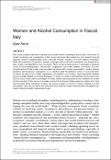Women and alcohol consumption in Fascist Italy
Abstract
This article examines discourses and practices around women's drinking in Fascist Italy. The history of alcohol production and consumption in Italy during the fascist dictatorship has only recently received attention; alcohol's gendered dimensions, especially women's drinking, have been hitherto overlooked. While the production of legislation, rhetoric and propaganda on alcohol consumption was dominated by men, women were identified as key constituents whose alcohol-related practices could make or break the causes of fascist propagandists, ‘anti-alcohol’ campaigners and alcohol industry associations. The article explains how Italian women were imagined and addressed by regime propagandists, alcohol industry producers and temperance campaigners as (a) simultaneously the principal victims of and responsibility bearers for male excess alcohol consumption, (b) potential ‘crisis-women’ whose unpatriotic drinking choices (whether English tea, French champagne or American cocktails) denoted their prioritising of fashion over fascist values and (c) gatekeepers of family alcohol consumer practices and consumers of alcohol in their own right. It then moves to examine sources left by interwar Italian women to explore what, how and when they drank. Ultimately, it argues that despite attempts to construct women's drinking in archly nationalistic terms, the discourses and actual practices of Italian women around alcohol consumption operated within profoundly transnational frames.
Citation
Ferris , K 2023 , ' Women and alcohol consumption in Fascist Italy ' , Gender & History , vol. 35 , no. 1 , pp. 212-248 . https://doi.org/10.1111/1468-0424.12566
Publication
Gender & History
Status
Peer reviewed
ISSN
0953-5233Type
Journal article
Description
Funding: UK Arts and Humanities Research Council (Grant Number(s): AH/L007436/1.Collections
Items in the St Andrews Research Repository are protected by copyright, with all rights reserved, unless otherwise indicated.

